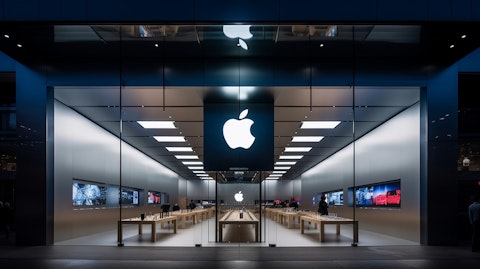We recently compiled a list of the 7 Best Computer Hardware Stocks to Buy. In this article, we are going to take a look at Apple Inc. (NASDAQ:AAPL) against the other computer hardware stocks.
According to a report by Research and Markets, the computer hardware market is projected to grow from $674.44 billion in 2023 to $710.32 billion in 2024, with a 5.3% compound annual growth rate (CAGR), mainly driven by personal computing, global supply chains, internet expansion, and more data centers.
By 2028, the market is expected to reach $914.55 billion at a 6.5% CAGR, fueled by trends like remote work infrastructure, sustainable practices, smart city development, and digital transformation. Key trends include edge computing, AI integration, modular systems, biometric security, and hybrid cloud environments, with significant investments in smart city projects, particularly in China.
The most important trends in the advancement of computer hardware are AI and machine learning which are revolutionizing hardware design and enabling applications like autonomous vehicles and robotics. Apart from that, the Internet of Things (IoT) is expanding, connecting more devices in smart homes, cities, and industries. It has led to a focus on improving security, efficiency, and the ability of different IoT devices, systems, and technologies to work together seamlessly.
Role of AI in the Growth of the Computer Hardware Industry
On May 28, Michael Fertik, founder of Heroic Ventures, joined CNBC’s ‘Squawk Box’ and said that we’re still in a phase of AI development where hardware is crucial. Companies like NVIDIA are thriving because their products are essential for running large AI models, which require immense computational power. He said that this situation is similar to how search engines, like Google or Bing, have long relied on substantial investments in hardware to function effectively.
Fertik added that as AI technology evolves, there will be a shift. The costs associated with AI hardware will decrease, and smaller, more specialized AI models will emerge, which will be tailored for specific industries or purposes.
When this happens, the focus and financial gains will also move toward software and computer science (software testing and development) companies. However, they will not significantly move from computer hardware companies and they will still benefit from the growing AI industry.
Industry Has Room for Growth Beyond AI
A major growth prospect for computer hardware is quantum computing, an industry that is expected to reach $11.4 billion by 2027 from $2.74 billion in 2022, according to Research and Markets. Quantum Computing offers significant benefits by improving the speed and efficiency of complex computations.
Unlike classical computers, which process bits as 0s or 1s, quantum computers use qubits that can represent multiple states at once, which enables them to solve problems much faster. This is especially valuable in fields like cryptography, drug discovery, financial modeling, and optimization as it solves complex simulations and calculations that are currently infeasible for classical computers.
Quantum Computing can significantly benefit the computer hardware industry by driving advancements in technology and creating new markets. Similar to AI, the development of quantum hardware requires innovations in materials science, cooling systems, and chip design, which can push the boundaries of traditional hardware engineering.
As quantum computers become more practical, they will require specialized hardware components, which will create new opportunities for companies to develop and supply these advanced technologies. For more details, you can read our article about the 12 Best Quantum Computing Stocks To Invest In.
Our Methodology
For this article, we used stock screeners and other financial media websites to identify 12 computer hardware companies with market capitalizations of above $1 billion. The analyst comments and ratings were mostly taken from The Fly and TipRanks.

An Apple store displaying the latest in consumer electronics, from smartphones to wearables.
Apple Inc. (NASDAQ:AAPL)
Stock Price as of August 9: $216.24
Average Analyst Price Target Upside as of August 9: 15.61%
Apple Inc. (NASDAQ:AAPL) is an American multinational technology company and remains a leading force in the global technology sector. The company has developed into one of the largest and most impactful entities in the industry. As a key player in the computer hardware market, its portfolio features the Mac series of personal computers, including models like the iMac, MacBook Pro, and Mac Pro, which are central to its business operations. In addition to these, the company’s iPad tablets and iPhone smartphones, both of which incorporate its exclusive hardware and software, play an important role in solidifying its position as a dominant force in the computer hardware market.
Its personal computers such as the iMac, MacBook Air, and MacBook Pro are equipped with its custom-designed processors, including the M1 and M2 chips. These processors, integral to the company’s shift to its own ARM processors, known as Apple silicon, combine the CPU, GPU, and other components into a unified system on a chip (SoC), improving both performance and energy efficiency. In addition, its iPad tablets and the iPhone smartphones feature advanced processors like the A15 and A17 Pro.
Apple (NASDAQ:AAPL) has showcased remarkable financial performance and growth potential, which reinforces its strong position in the technology market. For fiscal Q3, ending June 29, the company reported revenue of $85.8 billion, a 5% increase compared to the previous year. This figure exceeded analyst expectations, which were around $84.5 billion. EPS also saw an 11% rise, reaching $1.40, which surpassed the expected $1.35.
Its services segment, which includes popular offerings like the App Store and Apple TV, grew by 14% to $24.2 billion. This segment is particularly profitable, with gross profits increasing by 20% to $17.9 billion due to its high margins. One of the key drivers of Apple’s (NASDAQ:AAPL) future growth is its entrance into AI, branded as Apple Intelligence. This advanced AI capability will be exclusive to the iPhone 15 Pro and newer models.
One of the key drivers of Apple’s (NASDAQ:AAPL) future growth is its entrance into AI, branded as Apple Intelligence, which was introduced in June at its Worldwide Developers Conference. For Apple Intelligence, the company announced that the latest operating systems for iPhones, Macs, and iPads will introduce a range of generative AI-driven features integrated into native applications. Many AI functions will operate directly on the device, while more complex processes will be managed by its servers through a new service known as Private Cloud Compute.
Furthermore, the company announced that this service will utilize its proprietary server chips to support AI functionalities across all its devices. Lastly, Apple Intelligence will be accessible on the iPhone 15 Pro, and iPhone 15 Pro Max, as well as iPads and Macs with M1 and later models.
Analysts are optimistic that this could trigger a significant upgrade cycle for iPhones, potentially leading to a surge in sales as users seek the latest technology. On August 2, Citi raised the price target on Apple (NASDAQ:AAPL) to $255 from $210 and kept a Buy rating. The firm is particularly encouraged by early feedback on the new iOS18 features and the company’s potential to drive a major iPhone refresh cycle with its AI advancements.
Similarly, On August 2, Goldman Sachs also raised the price target on the stock to $275 from $265 and maintained a Buy rating. The firm highlighted the company’s strong performance in the iPhone sector and continued momentum in its services business. Goldman Sachs believes that it is on the verge of a significant multi-year replacement cycle for iPhones, which further enhances its confidence in the company’s future growth.
In summary, the company’s robust financial results, combined with its innovations in AI and strong performance in both hardware and services, position it well for continued success and increased market value.
As per the consensus opinion of 49 analysts, Apple (NASDAQ:AAPL) has a Moderate Buy rating. As of August 9, the average price target of $250.00 implies an upside of 15.61% to the stock’s current price.
Polen Focus Growth Strategy stated the following regarding Apple Inc. (NASDAQ:AAPL) in its Q2 2024 investor letter:
“The largest relative detractors in the quarter were NVIDIA, Apple Inc. (NASDAQ:AAPL), and Salesforce. In a reversal from some of the concerns driving the stock down in the first quarter, Apple re-emerged as a top performer in the second quarter. The company reported better-than-feared results in its iPhone segment that quelled concerns over weakness in China. Additionally, the company forecast a return to sales growth and announced a $110 billion stock buyback plan, the largest in U.S. history. Later in the period, at its Worldwide Developers Conference, Apple introduced long-awaited new AI features that spurred some optimism around an upgrade cycle for the iPhone and, more generally, the important role Apple may be able to play in the emerging AI landscape. We continue to study Apple closely, which we previously owned the company for many years during its growth phase, to determine if it is poised for another significant revenue and earnings growth period.”
Overall AAPL ranks 6th on our list of the best computer hardware stocks. While we acknowledge the potential of AAPL as an investment, our conviction lies in the belief that AI stocks hold greater promise for delivering higher returns and doing so within a shorter timeframe. If you are looking for an AI stock that is more promising than AAPL but that trades at less than 5 times its earnings, check out our report about the cheapest AI stock.
READ NEXT: $30 Trillion Opportunity: 15 Best Humanoid Robot Stocks to Buy According to Morgan Stanley and Jim Cramer Says NVIDIA ‘Has Become A Wasteland’.
Disclosure: None. This article is originally published at Insider Monkey.





